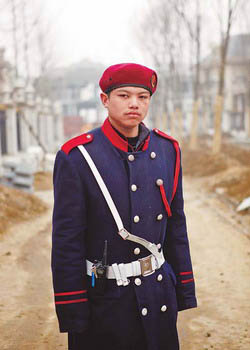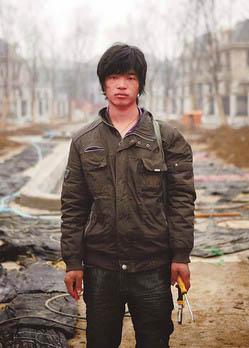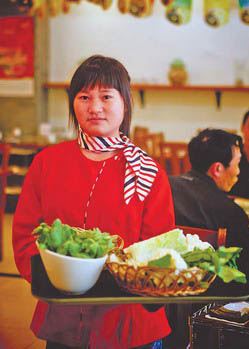Society
Unlike parents, young migrants won't take their fate lying down
By He Na (China Daily)
Updated: 2010-03-23 06:55
 |
Large Medium Small |
|
|
The sights of new-generation migrant workers are set far higher than their predecessors, both with working and living conditions, and unlike their fathers they are not satisfied with menial, repetitive jobs, say analysts.
"The labor shortage in the Pearl and Yangtze river deltas after the Lunar New Year holidays is just one example that displays the higher needs of new-generation migrant workers," said Su. "Short-term labor contracts add to their sense of alienation because there is no security. They simply live in the city, do unstable jobs and get irregular pay."
Enterprises should improve their management and take more responsibilities in training young people, he said. "If they just focus on cheap labor, one day the workforce will vanish."
For decades migrant workers have fueled the development of Chinese cities, but experts fear that the 100 million or more young people who now flock in from the countryside every year could clog the system.
Without a solution, the influx of unsettled, underpaid, over-motivated workers could be a serious threat to social security, say analysts.
In a recent survey of 3,230 inmates at three prisons in Guangzhou, academy director Xie found that robbery, burglary and intentional damage made up more than 80 percent of the crimes committed by young migrant workers. "Sex-related crimes and gang crimes also accounted for a high proportion," he said.
"They need to learn more about the law and to solve the disputes through regular channels, and not resort to violence," said He Bei, a defense lawyer with Beijing Boru Law firm.
However, Xie disagreed and said that the poor living conditions, insufficient education and fragile psychological conditions of new-generation migrant workers are what is driving them to crime.
"When high expectations meet the cruel reality, the great psychological blow that often occurs is easily converted into hatred and the desire for revenge against society," he said. "Young migrant workers are not just moving home. This is a total migration of culture, which involves a total transformation in living, concept, social value and psychology.
"They need more chances to gain education, skills and knowledge. We can guide and teach them to change their concept of life and social value. Society also needs to be more tolerant and respect them."
Once their problems are solved, this new generation can drive China's future development, say analysts.
"Among other groups, migrant workers have the greatest potential to boost domestic consumption in the future," said Fan Jianping, director of the State Information Center's economic research department. "Authorities should give them more choice and make it easier for them to settle in cities."
Between 150 and 200 million migrant workers are expected to move to cities, which means greater spending on housing, education, communication and healthcare, said Wang Xiaoguang, a researcher with the National Development and Research Commission, the nation's economic planning body.
Experts also expect the widening wealth gap between urban and rural residents will be closed, or at least narrowed, as more farmers - the majority of migrant workers - are registered as urban residents.
The central government has invested large amounts of money in rural development, especially on infrastructure. Many of the country's 500,000 villages are already linked to road networks and have modern amenities. "But none of these efforts can stop farmers from leaving their homes for the cities," said Dang Guoying, a researcher for the Chinese Academy of Social Sciences' institute of rural development. "Sometimes, the better the roads are, the more farmers will use them to go to cities."
"It is wrong to suggest farmers, who make up more than half of the population, can enjoy the fruits of modernization in the countryside. Only when there are less villages in the countryside, while still keeping some professional farms, can farmers enjoy modern society as much as urban residents."
FIRST PERSON: ZHAO ZHUONAN, 24
I was born and raised in a small village called Huangdi in Jilin province, but in 1997, when I was just 12, I moved with my family to the city of Jilin. My father, mother and I lived in a rented house, and my father worked as a decorator.
I gave up study when I graduated from middle school three years later. Honestly speaking, I really liked studying, but at that time my parents did not have stable jobs. We often didn't know where the next month's rent would come from, so going to university was out of the question.
I was 15 when I quit school and I really suff ered for it. I had a lot of problems fi nding a job. I’ve had several jobs: a waitress in a school restaurant, a barbershop apprentice, a kitchen cleaner. I even had a job handing out fl yers in front of a supermarket.
I have little choice but to do basic manual jobs. I’m limited by my lack of qualifi cations. At the moment I sell cosmetics in a department store. Although the salary is only about 1,200 yuan ($175) a month, I’m satisfi ed.
I don't mind working hard but I hate people looking down on me. I hate it when people call me a migrant worker. It makes me sound like a second-class citizen. I am not ugly, I wear the latest fashion and I speak standard Putonghua. I look just like a city girl. The only diff erence is maybe I'm more durable to hardships than city people.
My parents plan to go back to the village when they retire. We have a house and some land there. I have no desire to go back. Huangdi is still my registered permanent residence but village life is just a vague memory to me now. I’ve never worked in the fi elds and I’m already used to the life of the city. I hate walking on muddy village roads in the rain and I don’t like the quietness at night.
My father insists we can all make a living in the countryside, but I won't go back. My friends are here, my boyfriend is here and we want to get married soon. A dull countryside life would kill me. I know it is not easy to live in the city but I am still young. I believe I’ll be a real city girl one day if I just keep working hard.
— ZHAO ZHUONAN WAS TALKING TO HE NA
Wang Shanshan contributed to the story











